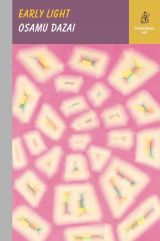|
Vážení zákazníci,
do 9. 2. probíhá inventura našeho skladu. Objednávky vytvořené v tomto období budou expedovány až po jejím ukončení.
Děkujeme za pochopení. |
Early Light
Storybook ND Series

| Autor: |
Osamu Dazai
|
| Jazyk: |
anglicky |
| Vazba: |
pevná |
| Počet stran: |
64 |
| Formát: |
16 x 23,9 cm |
| ISBN/EAN: |
9780811231985 |
| Nakladatel: |
New Directions |
| Rok vydání: |
2022 |
| Edice: |
Současná beletrie
/ Beletrie
|
Early Light offers three very different aspects of Osamu Dazai's genius: the title story relates his misadventures as a drinker and a family man in the terrible fire bombings of Tokyo at the end of WWII. Having lost their own home, he and his wife flee with a new baby boy and their little girl to relatives in Kofu, only to be bombed out anew. Everything's gone, the father explains to his daughter: Mr. Rabbit, our shoes, the Ogigari house, the Chino house, they all burned up, Yeah, they all burned up, she said, still smiling.
One Hundred Views of Mount Fuji, another autobiographical tale, is much more comic: Dazai finds himself unable to escape the famous views, the beauty once immortalized by Hokusai and now reduced to a cliche. In the end, young girls torment him by pressing him into taking their photo before the famous peak: Goodbye, he hisses through his teeth, Mount Fuji. Thanks for everything. Click.
And the final story is Villon's Wife, a small masterpiece, which relates the awakening to power of a drunkard's wife. She transforms herself into a woman not to be defeated by anything, not by her husband being a thief, a megalomaniacal writer, and a wastrel. Single-handedly, she saves the day by concluding that There's nothing wrong with being a monster, is there? As long as we can stay alive.
Review
Dazai offers something permanent and beautiful. --"The New York Times Book Review"
I like Dazai a lot. --Wong Kar-Wai
About the Author
OSAMU DAZAI was born in 1909 into a powerful landowning family of Northern Japan. A brilliant student, he entered the French Department of Tokyo University in 1930, but later boasted that in the five years before he left without a degree he had never attended a lecture. Dazai was famous for confronting head-on the social and moral crises of postwar Japan when he committed suicide by throwing himself into Tokyo’s Tamagawa Reservoir. His body was found on what would have been his 39th birthday. DONALD KEENE, the author of dozens of books in both English and Japanese as well as the famed translator of Dazai, Kawabata, and Mishima, was the first non-Japanese to receive the Yomiuri Prize for Literature. RALPH MCCARTHY has lived in Japan for almost two decades. He is the translator of two collections of stories by Osamu Dazai, “Self Portraits” and “Blue Bamboo,” and of Ryu Murakami’s novel 69.
Další knihy od tohoto autora
Diskuze
Žádný příspěvek do diskuze. Přidejte svůj názor »
|
















